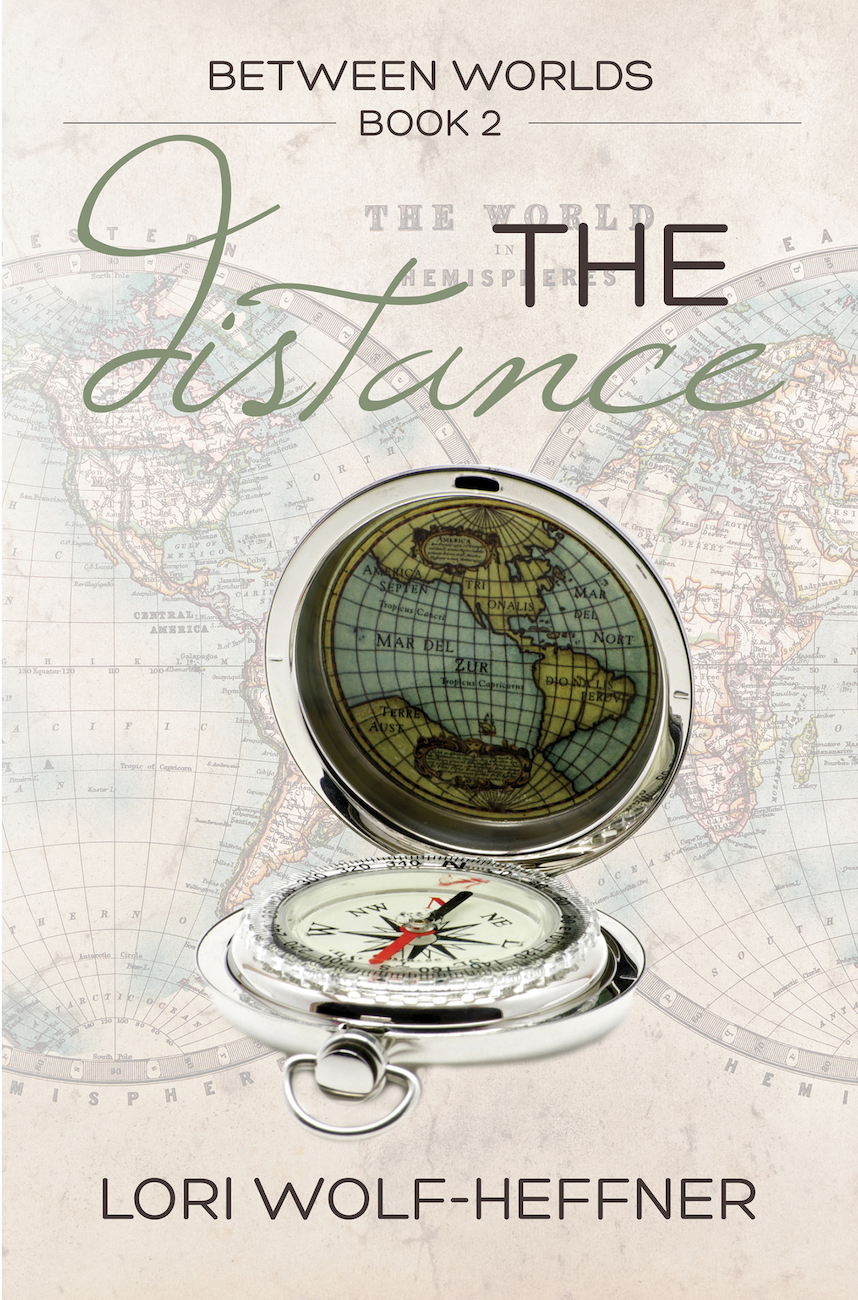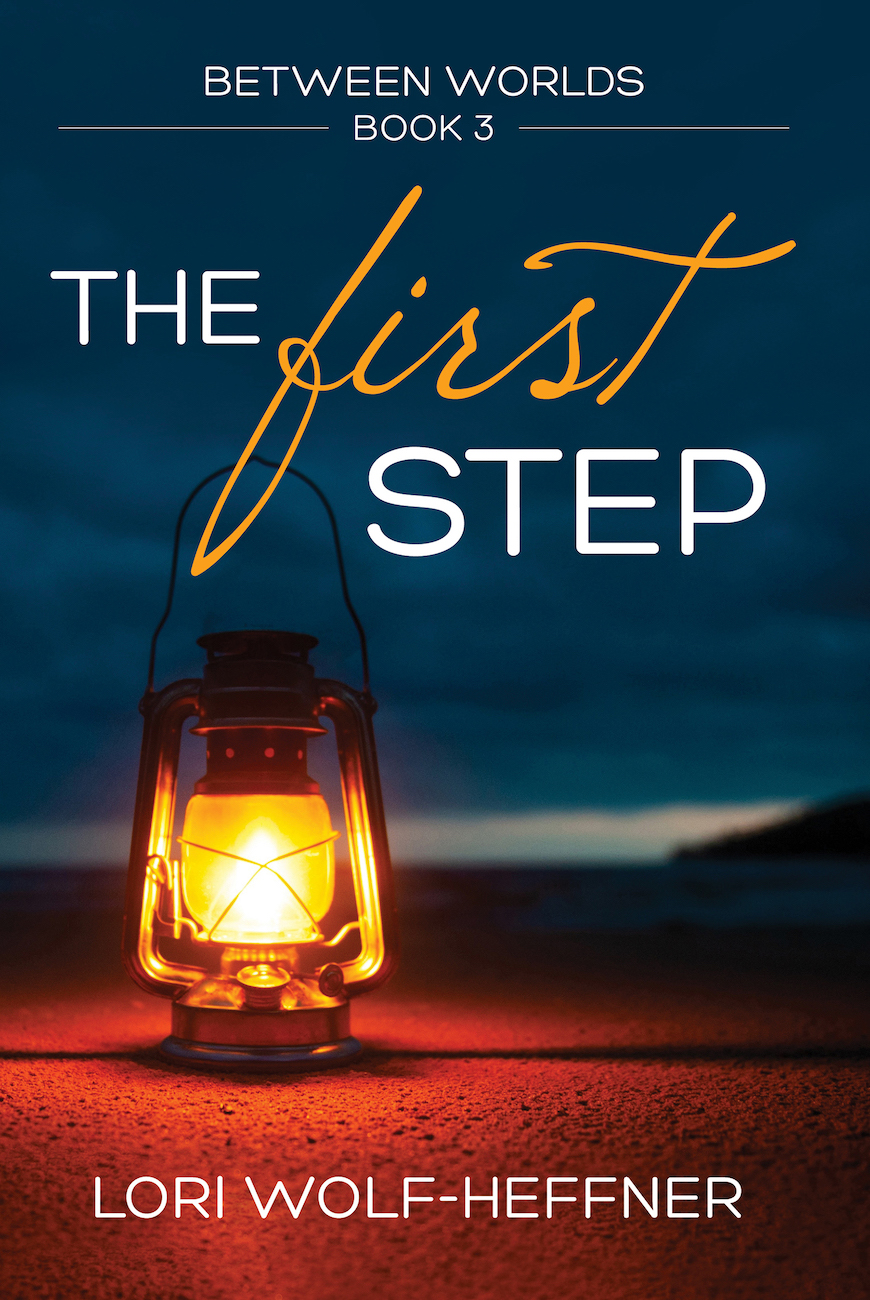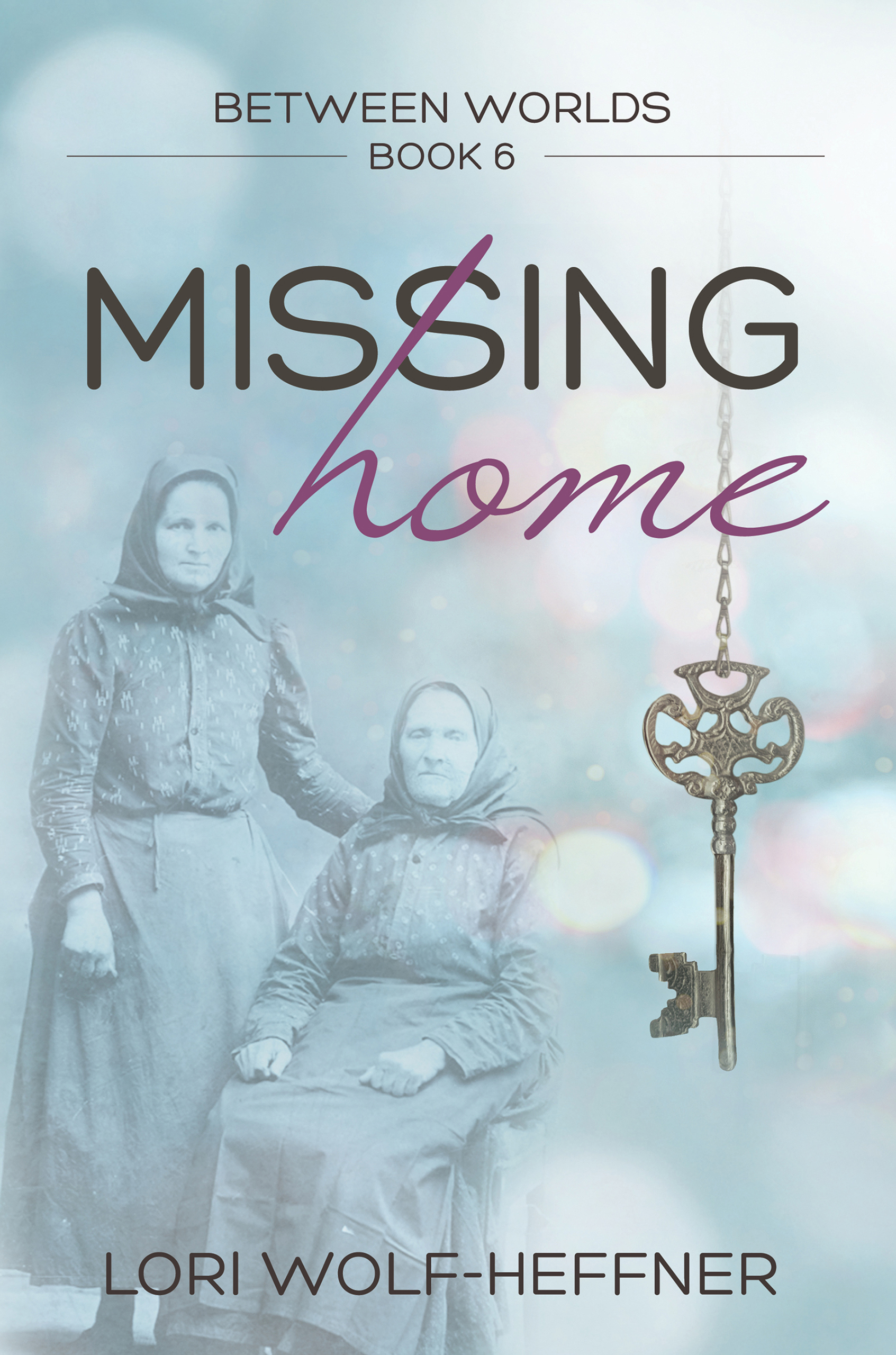Can a sketchbook from the past help Juliana move forward?

Between Worlds 7: What Will Come
Time will march forward, no matter how terrifying the future seems.
During a nursing home visit with her school’s dance group, Juliana catches a frightening glimpse into Opa’s possible future. Her grades begin to slip because she can’t study, worries of her grandfather’s future overcoming her. After everything she’s learned so far about how troubles were soothed in the past, Juliana hopes her great-grandmother’s sketchbook can help her again.
When Elisabeth’s mother suffers a terrible loss, Omama moves in to help the family while Mammi recovers. Living with Omama’s strict rules and discipline is already hard, but when Omama disapproves of Stefan, the kind man Elisabeth likes, because he lost an arm in the war, Elisabeth must find a way to convince Omama that she can determine her own fate.
While trying to be brave in the face of uncertainty, both girls must learn to embrace the changes the future may bring and to stand up for the future they believe in.
What Will Come is the seventh book in Lori Wolf-Heffner’s contemporary/historical series, Between Worlds. For those who love history, the arts, and family ties, pick up a copy of What Will Come and enjoy a story that crosses generations.
"Between Worlds 7: What Will Come is an amazing book that tackles Alzheimer and the family dynamics.."
 ReaderGoodreads
ReaderGoodreads"This is a beautifully written book with realistic characters. Lori has written a book that will touch your heart."
 ReaderGoodreads
ReaderGoodreadsBuy Between Worlds: What Will Come
Canada
US
International
Take a Peek...
Juliana didn't expect to get this nervous before a community show. The school bus with the dance and glee clubs pulled up to the main entrance of the old-age home. Ms. Lee stood up at the front of the bus and turned to face the students.
“Can I have everyone’s attention?” she said. She needed to repeat herself a few times before the thirty or so students in the bus quieted down. “Thank you. We’re about to go inside. Remember to use the hand sanitizer at the entrance and be friendly, but I know you all will be.”
Why would Ms. Lee tell them to be friendly? Old people were usually nice.
Ms. Lee asked the bus driver to open the door, and everyone filed out. Costumes were simple and already on: jeans of any style and yellow t-shirts with “Dance” on the front for the dance club and “Glee” for the glee club. “Eby Heights” was written on the back in block letters along with the school’s logo. Long hair in a ponytail, short hair neatly combed. Juliana usually needed at least an hour to get ready for competition dances. For this show, she’d only taken fifteen minutes.
The students filed out, and Juliana stayed close to a few girls she had gotten to know and who’d helped her learn the numbers. Two of them danced at another studio, and the third took dance at a music school in town. But everyone was friendly to everyone else, not mean like on some of the dance shows on TV.
The inside of the home looked pleasantly old-fashioned: deep reds, pine wood, floral wallpaper borders everywhere, with vases of artificial flowers placed on every available surface. Tables had been pushed off to one side and chairs spread out for a small audience. A few women were sitting in a corner, their white, permed hair perfectly coiffed, chatting. Juliana smiled at how cute they looked. A few men, their heads almost devoid of any hair, pulled some chairs up and began what appeared to be a lively debate. So, Opa’s not the only man who gets into heated discussions, she thought, smiling. She couldn’t wait to tell Sophie that—she’d get a good laugh out of it, too.
Juliana followed the group into a room where they dropped their belongings and began to warm up. They would start in about a half hour. Juliana’s heart pounded with excitement.
...
The glee club moved in unision as they sang “Somewhere Over the Rainbow,” their faces full of joy and hope. But Juliana felt neither. Now finished her two dances, she sat off to the side and watched the rest of the show. Instead of enjoying the glee club’s number, though, her gaze remained glued on the audience. The seniors who had been socializing when the students had first arrived were not the only ones in the audience anymore. More residents had been wheeled out right before the show: a woman with matted, white hair who talked to herself; a woman who looked asleep and whose thinning hair exposed most of her scalp; a man whose hands were clenched around washcloths. Some seniors even sat in wheelchairs that looked more like armchairs with wheels than the usual wheelchairs Juliana knew. All of these new people hardly moved their arms nor did they have any expression on their faces. In fact, if anything moved, it was usually only their eyes. Their hands looked jagged, as though their skin had been vacuum-sealed to their bones. The faint smell of urine hung in the air now, too.
“Where’s Bertram?” a woman shouted from the audience to no one in particular. “Bertram! Where are you? You’re missing the show!” An attendant gently touched her arm to calm her down. Juliana scanned the audience for anyone answering to Bertram but no one moved. She guessed Bertram wasn’t there.
“No, Bertram has to hear about this! He loves hearing the little children sing!” The woman tried to get up. Juliana guessed from the thinness of her legs that this woman didn’t walk anymore, though.
“Oh, stop it,” another woman said in annoyance. “He’s dead.”
The attendant for the first woman rushed to stand between them and asked her something. The woman nodded, and a moment later the attendant wheeled her elsewhere. The glee club members kept singing joyfully despite the disturbance, as Juliana expected. Dancers followed the same rule: the show must always go on unless the building’s about to collapse.
As Juliana’s eyes followed the woman, she noticed a group of happy men. One leaned over to another and whispered something. The second man smiled kindly and nodded. He reminded Juliana of Opa and the smile that lit up his face whenever she asked about Elisabeth.
Behind the men, though, sat a man in one of those big wheelchairs. He appeared frozen: his mouth hung open, his eyes stared at nothing, and his head hung a little to theside. He wore a bib that had wet spots on it.
Juliana swallowed to keep her stomach contents down. Where were all these people when we arrived?
During her dances, Juliana had fought to stay focused. Shoutouts of encouragement from her teammates at competitions and lots of cheering during year-end shows didn’t bother Juliana. On the contrary, they helped her dance better. But random conversations or unexpected cries or unpleasant smells... she had never danced with those kinds of distractions before.
A woman from the audience shouted and Juliana jumped, jolted out of her thoughts.
Ms. Lee sat down next to her and whispered, “Are you okay? I saw how that woman startled you.”
Juliana nodded, though it was a flat-out lie.
“Are you sure? I’ve been watching you for the past ten minutes, Juliana, and you’ve gone from scared to terrified and back again. You don’t look okay.”
“I’m fine,” Juliana said, unable to pull her gaze from thesmall audience. The questions in her head wouldn’t stop: Was this Opa’s future? Was this the real reason she and her parents had moved here? To make sure he wouldn’t end up like this? Or was he going to, anyway?
Oh my god, Juliana thought, trying to not let on to Ms. Lee that she’d realized something. Rachel and I said back in Calgary that Mom’s family should’ve put Opa in a home instead of making us move halfway across the country. Her stomach turned into knots. Any ads for retirement homes she had ever seen, whether at bus stops or at the mall, always showed old people smiling and enjoying an activity, like reading a book with a grandchild or walking hand-in-hand with their spouse outdoors. They never showed people so... Juliana didn’t want to let the word form in her mind. It was mean but she couldn’t prevent it. They never showed people so gross. The wet spots on that man’s bib were probably drool.
“Juliana, look at me.”
Juliana turned her head and Ms. Lee’s gentle face greeted her. “Are you sure you’re all right? I know this isn’t competition dance. You’re probably used to a higher standard...”
Was that what Ms. Lee thought? That the dancing was so bad it embarrassed Juliana to participate? She needed to correct that right away, but how? Juliana couldn’t admit to her teacher what she and Rachel had said in Calgary.
I even said the same thing to Mom in the car on the trip here, she realized. Her stomach began to churn.
“Juliana?”
“No, really, Ms. Lee,” she whispered back. “I guess I just feel bad for those people.” She tried to smile a little and relax her shoulders, but Ms. Lee still looked suspicious.“I’m really okay, Ms. Lee. This is a good experience for me.”
Ms. Lee began to move away. “I need to help with the last dance. Talk to me if you need to, understood?”
Juliana nodded, and after Ms. Lee returned to the dressing room, Juliana’s gaze returned to the man at the back with the bib.
Juliana had fought tooth and nail against moving to Kitchener, but she had acknowledged to Mom just last month that she was happy they’d moved. Juliana had met extended family— including Sophie— and she enjoyed spending time with them. She missed her best friend, Rachel, but they’d found a new normal for their long-distance friendship, and Juliana had fun with her newfriends— Jasmine at the studio, and Meghan and Shawna at school. With time, her circle of friends would grow. Of course, nothing surpassed discovering Elisabeth’s sketchbook and chatting with Opa to learn more about his mother.
But none of those reasons had anything to do with helping Opa.
They’re all reasons that benefit me, she thought.
Opa had just turned seventy-one. Was he now one year closer to ending up like that man because of his Alzheimer’s?
As soon as mass finished, she collected her siblings as they came down from the balcony, where all children sat, and instructed them to follow Peter-Bátschi and Sophie-Néni to their house. Elisabeth rushed home before anyoneasked her about Mammi or said anything else. Her uncle’s behaviour had even embarrassed her too much to say anything to Georg, Eva, or Stefan.
She entered her family’s front gate, walked through the front yard, then the second gate into the poultry yard, and up to the house door at the side of their white, thatch-roofed, three-room home.
Elisabeth found Mammi sitting at the kitchen table still dressed in her nightgown, her face pale, and her hair hanging all the way down her back. The midwife was gone but Omama and Margarethe-Néni sat with Mammi, each drinking—Elisabeth took a whiff— coffee? The Schuhmachers hadn’t had coffee in the house for several years now because of the war, but Elisabeth remembered when she was Luki’s age how Mammi would make coffee every morning before her day began. The familiar smell comforted Elisabeth.
Unfortunately, despite drinking something she enjoyed, Mammi’s face turned into a scowl. “You’re to be at your uncle’s.”
“But I just wanted to see how you were doing...” Elisabeth replied, not understanding why Mammi wouldn’t be happy that her eldest daughter had come to check on her.
“You’ve again disobeyed your elders. All of us, in fact. You were told to stay with your siblings and take them to Peter’s.”
Elisabeth’s jaw dropped. “But...” The Christian thing to do was to see if her mother needed help. Why was Mammi angry? Elisabeth remembered Georg’s warning about Mammi’s temper, though, and thought that maybe Mammi’s anger kept her from acting like a Christian herself right now.
“I’m fine,” Mammi said, her voice sharp. “Now, go.”
“But...”
Omama stood up and hobbled over to Elisabeth. “I’ll come with you a little ways,” she said. Usually an unpleasant woman, Omama was strangely gentle with Elisabeth this time.
“No, it’s all right,” Elisabeth said, feeling dejected despite Omama’s rare moment of kindness. “Thank you.”
But Omama slipped out of her house shoes and into her outdoor leather slippers and followed Elisabeth to the road.
“What your mammi is going through is not for young eyes,” she said. “Even though you are now a woman in our church, your body has not become that of a woman yet. There are some things you cannot know about until you are ready.”
Elisabeth’s body had not become a woman’s yet? She knew that her chest would grow, but what else would happen to her? She would read about it later in Tata’s encyclopedia when she had a private moment. Given that the topic was a woman’s body, it was certainly something neither Mammi nor her siblings could catch her doing. But with Omama in the house now, I may have to wait until she leaves. Omama didn’t approve of Elisabeth reading. She often said Elisabeth should put her time to better use.
“While I’m here, though,” Omama continued, “I’m going to take care of the household. One thing I’ve told Lissa already is that I dislike how little you’ve done to find a husband.”
“But Omama, I was just confirmed last week!” Elisabeth said. Although Mammi and Omama had tried introducing Elisabeth to a boy earlier this year, a serious search could not begin until after a girl was confirmed.
“You don’t have to wait for confirmation to invite families over or spend more time visiting neighbours and friends so mothers and matchmakers can get to know you better.”
It had indeed been a long time since Elisabeth had visited her friends in the evening. This tradition had a name: majen. Girls would invite their friends over to gossip and work on their handicrafts. Sometimes a mother or even a grandmother— someone respected by everyone for a specific handicraft, like knitting or embroidery—would teach the girls as they talked. Elisabeth enjoyed many handicrafts, but she was happy to not have to listen to gossip these past few months.
“Lissika,” Omama continued, “I needn’t remind you that the war has left fewer men to marry these days. Do want to be forced to marry someone who’s as old as your father or who lives in another village?”
Elisabeth shivered at the thought. Such marriages did occur but to marry a man at least twenty years her senior frightened her. It meant that when she was thirty, he would be fifty. When she was forty, with a brood of children at home, he would be sixty and, God willing, still alive. To live in another village? She’d be so far away from her family. The wife always moved in with the husband, of course. She didn’t know where the next Lutheran German congregation was: the Germans in all the villages around Semlak were Catholic. There was a Calvinist German church in Semlak, and a few Germans attended the local Catholic church, but to find a husband at either of those was out of the question.
You won’t do that to me, Jesus? Elisabeth asked. You’ll help me find someone here, in my church and village, won’t You?
Omama interrupted Elisabeth’s thoughts. “We also need to make sure the crops are properly planted. Rosina can help me during the day and Anna can help me when she gets home from school. Beginning Tuesday, you will go to the salasch each day to make sure crops are planted properly— I don’t trust Georg with your family’s land. Tomorrow you will show me where everything here is so I can take care of the household.”
A salasch was farmland with a homestead that lay outside the village. Opa Schuhmacher— Tata’s father— had owned it, and when he passed away, he had left most of the land to Konrad-Bátschi, Georg’s father. Tata had inherited a strip of land that could feed a family, but no more. Between Mammi, Tata, and Elisabeth, with some help from the three younger siblings, they could tend to their land, and Tata’s shoemaking business helped pay for extra labour when it was needed. However, without Tata at home, managing the seven acres was next to impossible. Mammi was slower at shoemaking than Tata, so where Tata took a day or two off as needed, Mammi did not. That left Elisabeth in charge of the fields as well as everything else in the household.
It was a gift from God that Georg and his brother Samuel had stepped in to help this year. However, the only ones who approved of the arrangement were Georg and Eva, Samuel and Deaf-Lissi, Elisabeth and her siblings, and, begrudgingly, Mammi. Omama disapproved strongly of it, as did Konrad-Bátschi and Margarethe-Néni.
“And you must visit my family this week,” Omama continued. “Little Sophie is inviting friends and family over one evening. You must get out more often.”
As much as Elisabeth did not like gossiping, she did miss spending time with others her age. With Omama tending to the household, Elisabeth could spend her time on the salasch without worrying about an additional list of chores at home and instead enjoying time with some of her father’s family. Since she had promised her siblings special cookies if they behaved all week with Omama, she knew they would be fine with this arrangement, too.
Elisabeth stepped onto the road, and Omama closed the gate behind her.
Omama continued. “We also need to make sure you’re ready for next Sunday’s dance. It would be embarrassing if you had no one to dance with at your first one, wouldn’t it?”
Next Sunday’s dance? All the whirling skirts and loudstomps on the dance floor! The live band playing slow waltzes and energetic polkas! Elisabeth hadn’t let herself think about the dances until now, because it would’ve seemed disrespectful to Jesus during Lent. After Mammi’s miscarriage yesterday, she hadn’t thought of it. Now that Omama brought it up, Elisabeth felt giddy. She smiled and nodded, and although Omama barely smiled— likeMammi, she believed smiling made her look stupid— she looked satisfied.
Maybe having Omama here to help for the week wouldn’t be so horrible after all. Elisabeth headed for Peter-Bátschi’s house, her mind changed about Omama’s stay.
The Between Worlds Series

Between Worlds 2: The Distance
How can family rifts be healed when problems from the past keeps pulling them apart?

Between Worlds 3: The First Step
Growing up is hard enough. Why does family have to make it harder?

Between Worlds 4: What Friends Do
Friends hold our hands and light the way through tragedy, no matter how far away they live.

Between Worlds 5: Hide And Seek
When do you give up on a search for a family treasure?

Between Worlds 6: Missing Home
Can a move half way across the country be a blessing in disguise?

Between Worlds 7: What Will Come
Time will march forward, no matter how terrifying the future seems.

Between Worlds 8: A Father's Journey
Sometimes a parent’s love, even when deeply desired, can become overwhelming.
All books are also avaliable in large print!
About Lori Wolf-Heffner
Lori Wolf-Heffner began baton twirling as a toddler. But one bonk on the head from that shiny stick sent her to jazz class instead, leading Lori into a successful competition dance career that culminated with becoming an inaugural member of the Canadian National Tap Team in 1996.
In 2015, the Canadian Senior Artists' Resource Network accepted Lori into their one-year mentorship program. Mentored by Carol McQuaig, Lori wrote the first version of Postcards in a Closet, a creative non-fiction memoir about Katharina Wolf, a great-grandmother who was a single mom-to-be in the aftermath of World War I. At first printed only for family, Lori published it later for the public.
Inspired by her great-grandmother’s story, Lori wrote and published Between Worlds 1: The Move in 2018. The rest, as they say, is history.

